The Social Welfare Corporation Asahigawa-so is one of Japan's leading large-scale comprehensive social welfare organizations, which provides comprehensive services such as medical care, nursing, and rehabilitation for people of all ages and disabilities. Since its establishment, the organization has not only been operating in Japan but also is committed to imparting experience to and conducting exchanges with developing countries in East Asia, and especially China, to improve overall human welfare in Asia.
As the first city in China to have an aging society, Shanghai began its interaction with Asahigawa-so more than 30 years ago, and carried out fruitful friendly exchanges and cooperation in the fields of civil affairs, social welfare, and medical care. In addition, the two sides cooperatively introduced the advanced concept of Japanese nursing and corresponding technologies to Shanghai, and have trained a large number of talents in related fields.
Inheritance and development of aging career’s exchange between China and Japan
Asahigawa-so’s former director, Egusa Yasuhiko, once receivedthe Honorary Citizen of Shanghai award for his contributions to the friendly exchanges between China and Japan in medical welfare after he took office in 1985. Yasuhiko visited China more than 150 times throughout his life, most of which were to Shanghai and almost all kinds of elderly caring institutions in the city. Having forged a profound friendship with people in the circle of civil affairs and health, Yasuhiko once said he himself was an elderly person from Shanghai and the happiness of the elderly in Shanghai was his happiness.
In 2015, Yasuhiko died of disease. Two years later, in his hometown of Okayama, a Memorial to Yasuhiko was opened to the public with a paper-cut portrait of Yasuhiko presented by the Shanghai People’s Association of Friendship with Foreign Countries (SPAFFC) hung at the entrance. The portrait together with two white magnolias outside the window expressed the nostalgia of the Shanghai people for the great man.
It is under the influence of Yasuhiko that Atsushi Obata, the current director of Asahigawa-so, joined the institution to become dedicated to the friendly exchanges between China and Japan.
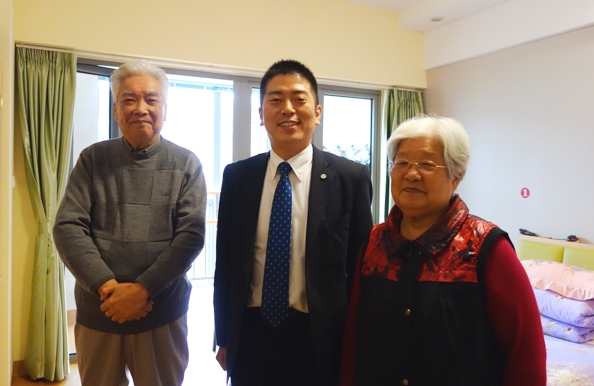
Atsushi Obata poses a photo with two elderly from Shanghai. [Photo provided to Eastday]
Since taking office in 2011, he has visited Shanghai 9 times to investigate the medical situation of the city and to accordingly dispatch experts to give public welfare lectures. He has also received and given lectures to 135 people from Shanghai in Asahigawa-so. In addition, he has taken the lead in compiling an introductory textbook for the elderly nursing profession and presented such to the Shanghai Civil Affairs Department for free.
Obata got acquainted with Yasuhiko during his career in Okayama.“I was deeply touched by Yasuhiko who was working on the welfare of the disabled and the elderly in Japan,” said Obata.“Under his influence, I resigned to work in Asahigawa-so.”
According to Obata, in 1998, Asahigawa-so further deepened the exchange with Shanghai and established the Japan-China Medical Welfare Training Center in Shanghai. The office space was provided free of charge by the then Luwan District government of Shanghai (which is now merged into Huangpu District). Staff from Asahigawa-so resided in the center to give training and organize seminars for elderly nursing instructors in Shanghai. When the talent training business of the Center got on the right track in 2015, the office was transferred to Japan.
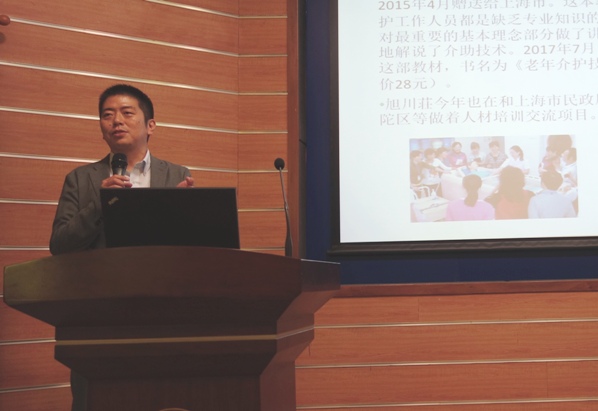
Obata gives a speech in Fudan University. [Photo provided to Eastday]
Since Obata took over the center from his predecessor Yitano Misako in 2016, he has inherited the tradition of friendly exchanges and actively expanded the cooperation areas, such as evaluation and care of cognitive issues, employment and self-reliance for disabled people, aged care and care for children with disabilities.
Showing love in nursing
Although Obata has visited Shanghai frequently in recent years, he clearly remembers the mood when he first came to Shanghai. In September 2011, he came to Shanghai as a member of a 60-member delegation from Asahigawa-so and visited Shanghai's nursing homes and child welfare agencies. “Before the visit, I always thought that the facilities in Japan would be much more advanced. But I found that Shanghai had a lot of new equipment imported from Europe and America and I marveled at the spirit of Shanghai learning from all over the world in various fields,” said Obata. Besides, the high-rises in the city and the infrastructure construction just after the World Expo, showed that Shanghai's economic development was really amazing.
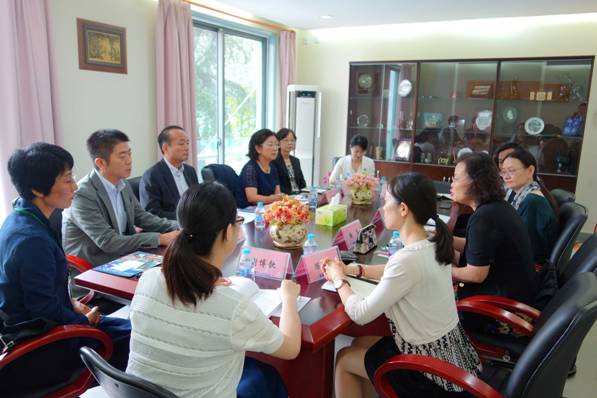
Obata participates in a seminar in Shanghai. [Photo provided to Eastday]
For Obata, talent cultivation matters most in the two sides' cooperation. Up to now, through relevant talent projects, nearly 400 senior nursing instructors and medical staff for seniors and the disabled have been trained.“A few years ago, I got to know that several of the authors of Shanghai’s senior care textbooks had been trained in Asahigawa-so, and this made me very comforted,” Obata said. There will be more and more caring needs of the elderly in China, so Asahigawa-so hopes to help China develop more professionals to meet the growing needs in all areas of elderly life. The nursing industry is a labor-intensive industry centered on human services, so talent cultivation is crucial.
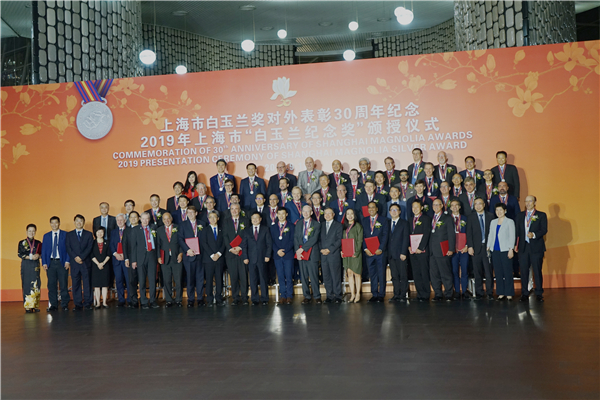
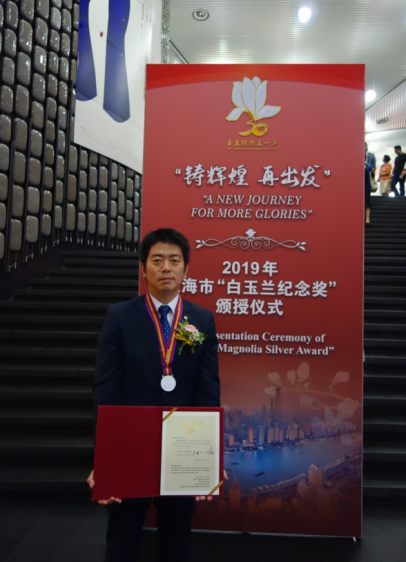
Obata poses a photo before the board at the Presentation Ceremony of the 2019 Shanghai Magnolia Silver Award. [Photo by Fan Yicheng/ Eastday]
In Obata’s opinion, it is not necessarily the best method to help the patients with basic activities such as eating and going to the toilet, but what matters most is to guide them to realize the greatest potential to look after themselves.
In the field of elderly care, it is necessary not only to increase the infrastructure, but also to train talents in a planned manner. Japan began implementing national qualification examinations for social welfare scholars and nursing staff 30 years ago."Japan's aging population began20 to 30 years earlier than China, so I think that there are many experiences in Japan that are worthy of reference for China," Obata said.
On September 12, 2019, Obata was awarded the Shanghai Magnolia Memorial Award for his outstanding contribution to Sino-Japanese exchanges. In an interview with Eastday.com, he said that he was very honored to receive the award. He does not claim it personally, but for the joint efforts of his colleagues in Asahigawa-so who have worked in Shanghai. He hopes to continue to deepen the friendly exchanges between China and Japan in the future.
(Story by Fan Yicheng
Translated by Zheng Qian)
